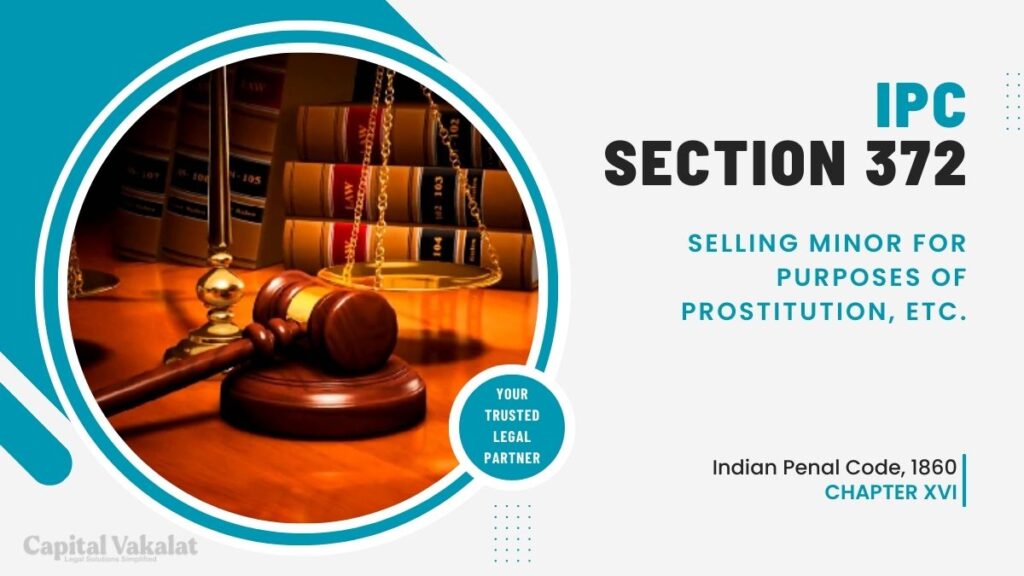In the intricate web of legal statutes that govern our society, Section 372 IPC stands out as a stark reminder of the heinous acts that can unfold within its purview.

This provision, which addresses the selling of minors for purposes of prostitution and related activities, casts a long shadow on the gravity of such offenses.
Historical Context
The roots of Section 372 IPC can be traced back through the annals of legal history, evolving with societal changes and the need for more stringent measures against crimes involving minors. Amendments over the years reflect the continuous effort to adapt to the evolving nature of exploitation.
Legal Framework
To understand the enormity of this offense, it is crucial to delve into the elements of Section 372 IPC. The section outlines what constitutes “selling” a minor and the various activities falling under the umbrella of “prostitution, etc.” The accompanying punishments and penalties serve as a deterrent against those contemplating such reprehensible acts.
Scope of Section 372 IPC
Defining the nuances of “selling” a minor and deciphering the multifaceted aspects of “prostitution, etc.” is essential for a comprehensive understanding of the scope of Section 372 IPC. Legal experts and scholars have debated the intricacies, leading to a nuanced interpretation of the provision.
Challenges in Prosecution
Despite the clear legal stance, prosecuting cases under Section 372 IPC poses unique challenges. Gathering evidence in such cases is often a daunting task, and the vulnerability of minors adds another layer of complexity. Issues in victim testimony further complicate the legal process.
Impact on Minors
The repercussions of being subjected to the offenses outlined in Section 372 IPC extend far beyond the legal realm. Minors involved in such activities face severe psychological consequences, and societal stigma compounds their trauma, making recovery an arduous journey.
Case Studies
Examining noteworthy cases under Section 372 IPC provides insight into the real-world implications of the legal provision. Legal precedents set by these cases shape the landscape of how the law is interpreted and enforced.
Government Initiatives
Recognizing the urgency of addressing crimes against minors, legislative measures have been put in place to strengthen the legal framework. Additionally, rehabilitation programs aim to provide support and a path to recovery for the victims of such offenses.
Public Awareness and Education
Preventing crimes under Section 372 IPC requires a multifaceted approach. Public awareness campaigns, community involvement, and educational initiatives play pivotal roles in creating a society that is intolerant of such atrocities. Schools and NGOs are crucial in shaping the mindset of future generations.
Conclusion
In conclusion, Section 372 IPC serves as a bulwark against the exploitation of minors for illicit activities. The gravity of the offense demands a concerted effort from all stakeholders to ensure the effective enforcement of the law and the protection of vulnerable members of society.
Frequently Asked Questions
What constitutes “selling” a minor under Section 372 IPC?
The term “selling” a minor involves any transaction or arrangement where a minor is handed over for purposes of prostitution or related activities in exchange for monetary or non-monetary gains.
Are there any recent amendments to Section 372 IPC?
As of my knowledge cutoff in January 2022, please check the latest legal resources for the most up-to-date information on amendments.
How can individuals contribute to preventing crimes under Section 372 IPC?
Individuals can contribute by raising awareness, supporting NGOs working in the field, and advocating for stricter enforcement of the law.
What rehabilitation programs are in place for minors affected by offenses under Section 372 IPC?
Rehabilitation programs may vary by region, but they generally focus on providing psychological support, education, and vocational training to help minors reintegrate into society.